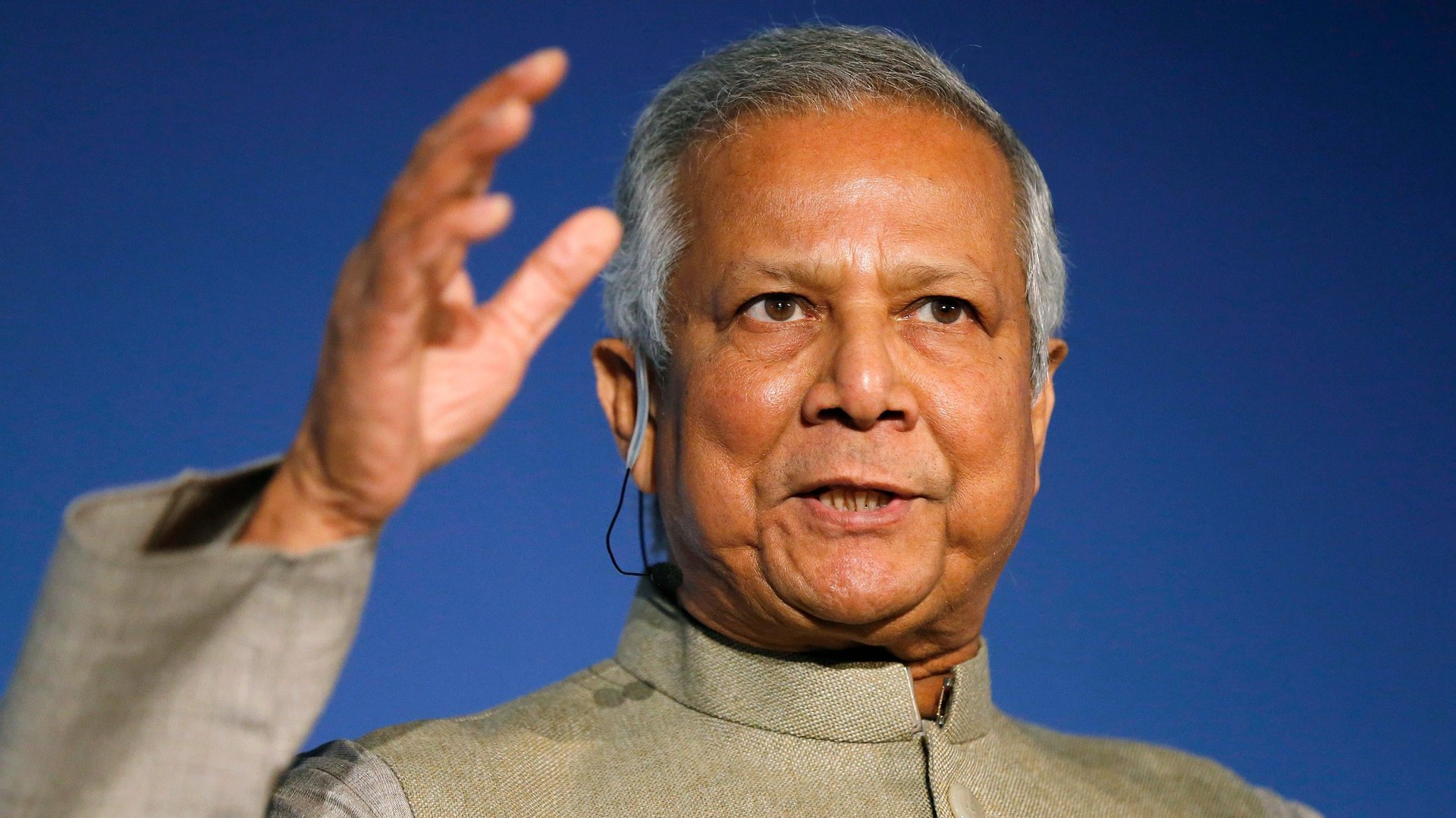Muhammad Yunus, the father of microfinance, is facing a prison sentence
The Bangladesh government has brought an onslaught of legal cases against Muhammad Yunus over the last decade

Among foreign economists and civil society activists, the Nobel laureate Muhammad Yunus is an icon for extending microloans to those too poor to access conventional banks. But at home, in Bangladesh, he has been increasingly vilified—and now faces time in prison.
Suggested Reading
Sheikh Hasina, Bangladesh’s prime minister, has routinely torn into Yunus, calling him a “bloodsucker” of the poor for coercing loan repayments, and even blaming him for the World Bank’s 2012 decision to withdraw from a crucial bridge project. Most recently, Yunus and his associates at Grameen Telecom—separate from Grameen Bank, his pioneering microfinance institution—have been put on trial in a labor law violations case.
Related Content
Ten days ago, Bangladesh’s highest court turned down an appeal from Yunus, which will allow the case against him to proceed. His daughter Monica Yunus, who leads a New York nonprofit called Sing for Hope, claimed on LinkedIn on Aug. 28 that Hasinia has threatened to arrest Yunus without bail in the next week or two. If convicted, Yunus would be sentenced to at least six months in prison.
These events unfold mere months before Hasina seeks her fifth term in office. Analysts of Bangladeshi politics have speculated that Yunus’ Nobel win in 2006 as well as his formation of a rival political party in 2007 have rankled Hasina. Now, with elections looming, she’s come out all guns blazing.
Quotable: A Nobel laureate faces prison
“Sheikh Hasina’s jealousy and spitefulness knows no bounds—she has threatened him on a regular basis over the past 15 years. Given the upcoming elections in January, she has intensified her direct public attacks against him by making false accusations that have now resulted in court cases. A week ago, the Supreme Court in Bangladesh rejected an appeal, which means there is a real danger that my father could be arrested imminently.”
—Monica Yunus on LinkedIn
A brief timeline of the persecution of Muhammad Yunus
2008: Hasina comes to power.
2011: Yunus is forcefully removed from Grameen Bank, which he started, over retirement age regulations in 2011. He fought and lost a legal battle challenging it.
2013: Yunus goes on trial, charged with receiving money from overseas without government permission, including his Nobel Prize purse and royalties from a book.
September 2021: A labor law violations case is filed against Grameen Telecom executives, including Yunus.
May 2023: A high court orders Yunus to pay 120 million taka ($1.2 million) in taxes for his charitable donations to three trusts, right after Bangladesh’s anti-graft watchdog sues him for the alleged embezzlement of more than $2 million from the employees’ welfare fund of Grameen Telecom.
August 2023: The trial in the labor law violations case begins on Aug. 22. The accusations against the Grameen Telecom executvies include failing to make permanent the jobs of 101 employees and to establish a workers’ welfare fund. Eighteen former Grameen Telecom employees also sue Yunus for “misappropriating” dividends.
By the digits: The international chorus backing Yunus
176: The number of signatories on an open letter to Hasina, including more than 100 Nobel laureates, world leaders like ex-US president Barack Obama and the former UN Secretary-General Ban Ki-moon, calling for a stop to the “continuous judicial harassment” of Yunus. The letter ran as a full-page ad in the international edition of the New York Times yesterday (Aug. 31).
“A million dollars”: How much a Bangladesh minister estimated as the cost of a “two-page” advertisement with several global signatories, published in the Washington Post on March 7 in favor of Yunus.
$83,430: How much one A-7 page ad in the Washington Post would actually have cost, based on the per-column-inch rate of $927 applied to a full-page ad, as per the Washington Post. Additionally, the Protect Yunus Campaign “negotiated a significant discount below this published amount,” it disclosed.
One more thing: The US is keeping an eye on the Bangladesh elections
Antony Blinken, the US secretary of state, announced a new visa policy in May “to support Bangladesh’s goal of holding free, fair, and peaceful national elections.” Under the policy, the US can restrict the issuance of visas for any Bangladeshi who undermines the democratic election process in the country, including members of pro-government political parties, law enforcement, judiciary, and security services.
Related stories
⚖️ 176 world leaders and Nobel laureates urge Bangladesh to halt legal cases against Peace Prize winner